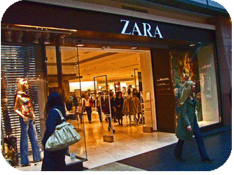 The years following the start of the recession have not been kind for much of the retail industry. For the clothing company Zara, however, the downturn has been something of a blessing. The Spanish brand came to global prominence in the 1990s as its affordable but fashionable looks started to arrive at stores on foreign shores. Today the company brings in more than $9 billion annually from 1,600 locations as shoppers the world over turn to Zara’s lower price tags rather than luxury and economy brands.
The years following the start of the recession have not been kind for much of the retail industry. For the clothing company Zara, however, the downturn has been something of a blessing. The Spanish brand came to global prominence in the 1990s as its affordable but fashionable looks started to arrive at stores on foreign shores. Today the company brings in more than $9 billion annually from 1,600 locations as shoppers the world over turn to Zara’s lower price tags rather than luxury and economy brands.
Like a combination of Trader Joe’s and Wal-Mart, Zara uses its economies of scale to churn out high quality fashion for a fraction of the price of its exclusive competitors. A team of more than 400 designers constantly devises new creations regardless of the season. This strategy fits in with billionaire founder Amancio Ortega’s philosophy that fashion should be democratized rather than monopolized by an elite group of tastemakers. Ironically, Ortega’s populist business model works as well as it does because he’s not afraid to take aspects of high fashion’s hottest designers and re-appropriate their ideas for Zara. This has led to a few contentious instances with some of the industry’s haute brands. For instance, the luxury shoemaker Christian Louboutin unsuccessfully sued Zara for allegedly stealing the design of a signature pair of red-soled high heels.
In most instances, a niche brand like Louboutin wouldn’t care much about the offerings of a big-box retail giant. However, the quality of Zara’s shoes and their $100 price tag are enough to scare an aspirating brand like Louboutin, who’s footwear regularly runs more than $1,000 a pair. High-end companies expect typical consumers to consider luxury brands as something unattainable or at the very least unique. But if another store is selling the same thing for an enormous markdown, it cheapens the value of the exclusive brand. While this disruptive way of doing business may hurt luxury companies, it’s meant nothing but good news for Zara’s bottom line and for fashion-conscious consumers striving to dress for less.
Questions:
- Why is it often difficult for lower-price brands to compete with luxury brands?
- Will Zara continue its growth as the world’s economies recover from recession?
Source: Alex Cuardos, “Bad News is Good News for Clothier Zara,” The Washington Post, November 10, 2012. Photo courtesy of Leif Harboe.
